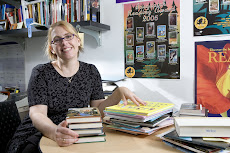In my last entry I noted the book, Teaching Visual Literacy: Using Comic Books, Graphic Novels, Anime, Cartoon, and More to Develop Comprehension and Thinking Skills. Graphic novels are huge in the children’s and young adult publishing world. I belong to Puget Sound Council, a children’s literature review group composed of school and public librarians who read and review children’s literature. The librarians are actively adding graphic novels to school library collections. When you are at work or at your placement school, stop by and ask the school librarian to introduce you to some good graphic novels.
To become familiar with the genre, read Gene Yang’s article, “Graphic Novels in the Classroom,” in the January 2008 (vol. 86 no.3) issue of Language Arts.* The article is written in graphic novel format! He discusses their popularity, provides definitions and offers creative ways to use these books in the classroom. He also offers a short bibliography of graphic novels. The Campus Library’s Children’s Literature Collection carries the novels he recommends as well as others. See me or another librarian for more information on how to find them in the collection. (Yang has more ideas on his web site www.geneyang.com/comicsedu). This article is a wonderful introduction to graphic novels especially if you are someone like me who says, “I don’t like graphic novels…”
I’m not going to quibble about the genre of Brian Selznick’s Caldecott Award winning book, The Invention of Hugo Cabret: A Novel in Words and Pictures. When you see it, you’ll think, “Wow. That’s a big book.” But the integration of the story and the illustrations not only make for quick reading, it’s also amazingly powerful. Selznick proves he’s a genius with this book. When the clock keeper doesn’t return to the train station, Hugo is afraid that he will be taken away so he continues to maintain the clocks inside the walls of the train station in Paris. It’s 1931 and Hugo has no family or friends until he meets a girl and her godfather. Although Hugo’s secret could be jeopardized, Hugo finds understanding and friendship in the relationships.
I’ll probably write this a lot, but this is one book you have to read!!!
*If you are reading this post at home, be sure to click on the red off-campus access button before accessing the article from Language Arts.
